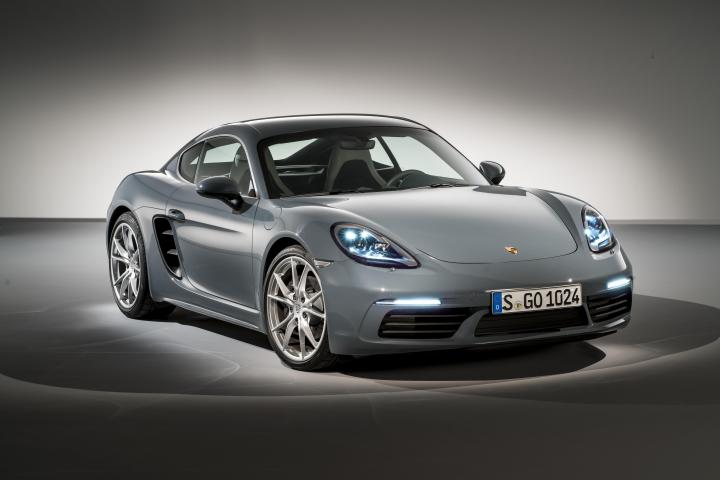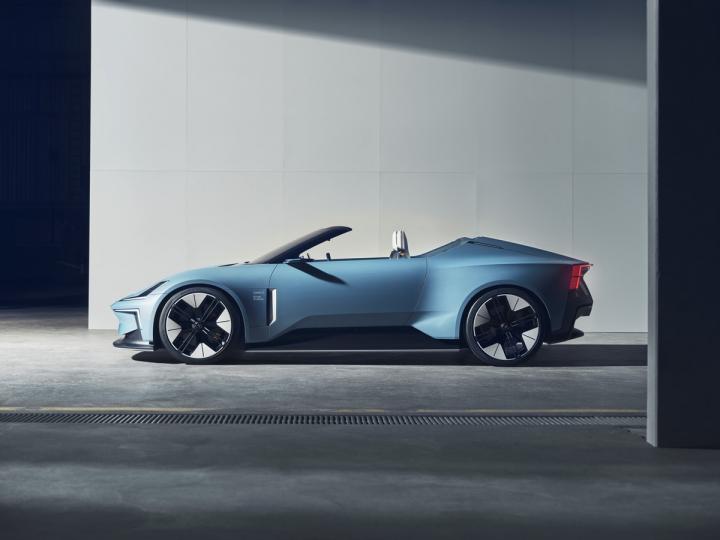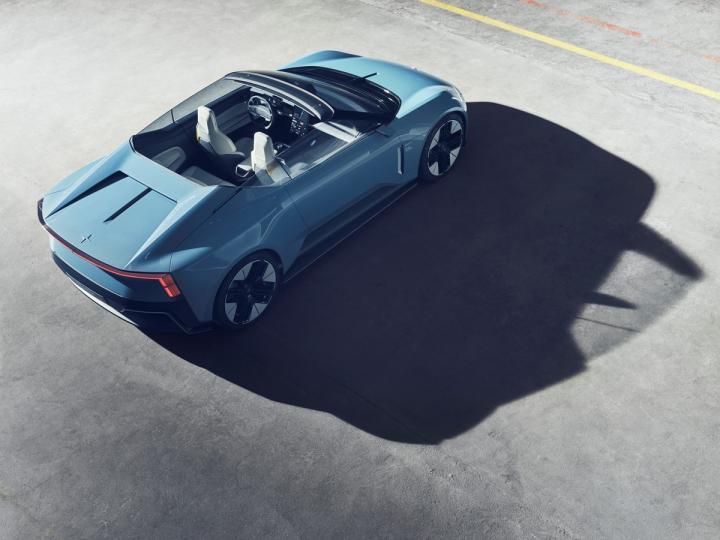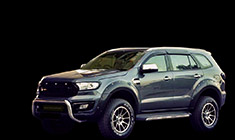News
China's first supercar 'Hyper SSR' unveiled by GAC
The lower trims claim a 0-62 mph (0-100 km/h) of 2.3 seconds, while the top trim claims 0-100 km/h in just 1.9 seconds.
Guangzhou Automobile Group (GAC) has unveiled what is reportedly China's first supercar, the Hyper SSR. As per reports, the Hyper SSR is an all-electric supercar with a price tag starting at around $230,000.
GAC recently spun off 'Hyper' as a separate sub-brand offering performance-based models. The SSR is the first model under the newly formed sub-brand and is an acronym for "Super, Sport, Race". The supercar from China will be available in three variants: Hyper SSR, Hyper SSR Sprint & Hyper SSR Ultimate.
The sleek supercar comes in the form of a low-slung two-door coupe. There is plenty of carbon fibre used all around its exterior and interior. Other design details include bespoke wheels with massive red calipers and plenty of aero elements, adding 100 kg of downforce. Inside, the car features a massive 14.6-inch central touchscreen and an 8.8-inch digital instrument cluster. The cabin makes use of a mix of leather and Alcantara materials, offering a premium feel along with plenty of carbon fibre and a yoke-style steering wheel.
As per reports, the Hyper SSR comes with three electric motors producing a total power output of around 1,224 BHP and 1230 Nm. The lower trims claim a 0-62 mph (0-100 km/h) of 2.3 seconds, while the top trim claims 0-100 km/h in just 1.9 seconds. Top speed is limited to 155 mph (249 km/h). The supercar gets a 75 kWh battery pack, offering 314 miles (505 km) on a single charge, as per the CLTC cycle.
Source: CarBuzz
News
BYD's new supercar can drive on 3 wheels & bounce around
The low-slung supercar will be powered by a quad-electric motor setup, producing over 1100 BHP.
BYD premiered its new electric supercar, the YangWang U9, at the Shanghai Auto Show. However, apart from the standard features and tech expected on an EV, BYD also showcased the U9 supercar with something very unique - Disus-X, its advanced suspension system.
The YangWang U9 electric supercar rolled onto the stage bouncing up and down, similar to the party trick offered by the Mercedes-Benz GLE's air suspension. However, the system on the BYD supercar is said to be more advanced. The Disus-X suspension system comprises of an Intelligent Damping Body Control System, an Intelligent Hydraulic Body Control System and Intelligent Air Body Control System; all of which combine to provide the supercar with complex vertical, lateral and longitudinal motion control. BYD states that the bouncing showcased on the U9 relies solely on the kinetic power of the suspension.
Along with this, the U9 supercar drove onto the stage with just 3 wheels and used the advanced suspension system to lift up the corner without a wheel. This feature could come in handy if ever a customer experiences a serious tyre or wheel failure.
Coming to the electric supercar itself, it's part of YangWang - a new luxury EV brand by BYD. The low-slung supercar will be powered by a quad-electric motor setup, producing over 1100 BHP. BYD claims that the YangWang U9 can sprint from 0 - 100 km/h in under 2 seconds.
Source: CarScoops
News
Rimac Nevera could accelerate from 0 - 60 mph in under 1 second
Rimac recently started deliveries of the Nevera electric hypercar, with 2016 F1 world champion Nico Rosberg as their first customer.
The Rimac Nevera is a 1914 BHP electric hypercar which has a claimed 0-100 km/h acceleration time of 1.85 seconds. However, according to a media report, the electric hypercar could have the capability to accelerate even faster.
When asked if the electric hypercar could accelerate from 0-60 mph in one second or even half-second, Rimac's Chief Program Engineer, Matija Renic responded by saying, "below one second".
However, Renic did mention that the Nevara wasn't built for drag-strip bragging rights but as a genuine driver's car offering an enjoyable drive. Renic further added that although the Nevera is very fast and the company is proud of the numbers, the car is more than that. The Nevera, according to the company, is very complex and showcases what automotive technology in the future can do. The car is meant to offer an engaging and rewarding driving experience, rather than being a one-trick pony on a drag strip.
Rimac recently started deliveries of the Nevera electric hypercar, with 2016 F1 world champion Nico Rosberg as their first customer.
Source: TheDrive
News
Chevrolet Corvette EV & hybrid variants confirmed
The upcoming electric sports car could also be called 'E-Ray'.
Chevrolet has confirmed that it will introduce an electrified powertrain on its Corvette sports car. The carmaker confirmed that the Corvette hybrid will be unveiled in 2023, while an all-electric version of the sports car will soon follow.
The upcoming Chevrolet Corvette hybrid will come with an all-wheel-drive setup. The hybrid sports car will feature a small battery pack and dual electric motors (one on each front wheel) which will be paired to the existing mid-mounted V8 engine. The electric setup will power the front wheels, while the V8 sends power to the rear axle.
The fully-electric version of the Corvette is expected to arrive at a slightly later stage. Chevrolet is yet to announce a timeline for the Corvette EV. While details are scarce, the all-electric sports car is expected to be underpinned by General Motor's Ultium platform. The upcoming electric sports car could also be called 'E-Ray', a name Chevrolet had trademarked back in 2015.
News
All-electric Porsche 718 sports car confirmed
Blume also confirmed that Porsche is working on a hybrid version of the 911.
Porsche CEO, Oliver Blume, has confirmed that the next generation of the 718 sports car range, will be offered exclusively with an electric powertrain. The Porsche 718 range, which consists of the Boxster and Cayman, will go fully electric, with its debut scheduled for some time during the mid-decade.
The Porsche 718 sports cars will be the third all-electric offering from the German brand, after the Taycan and the upcoming Macan EV. It will, however, be the first-ever 2-seater EV sports car from Porsche.
Blume also stated that the electric 718 will carry forward the typical dimensions of a roadster. The EV sports car could come with both RWD and AWD configurations. Reports suggest that the 718 EV range will be built at the brand's Stuttgart factory, on the same production line as the 911.
Blume also confirmed that Porsche is working on a hybrid version of the 911.
Source: AutomotiveNews
News
Polestar O2 electric roadster concept unveiled
If the Polestar O2 makes it into production, it will rival the upcoming Tesla Roadster.
Polestar has unveiled its all-new roadster concept, called the O2. The new Polestar O2 comes in the form of a 2-door sports car with a retractable hardtop and a 2+2 seating configuration.
The Polestar O2 borrows design cues from the brand's 2020 Precept concept, which also previews the Polestar 5 EV set to debut in 2024.
The O2 roadster concept will use an adapted version of the aluminium architecture, which will underpin the Polestar 5. The roadster concept is substantially shorter than the Polestar 5 and also features a 400 mm shorter wheelbase. Polestar has removed the 'foot garage' on its skateboard chassis floor on the O2, which is said to help offer huge rigidity and also improve handling and dynamics.
As with any Polestar EVs, the concept has been designed and developed with a lot of sustainable and recyclable materials. It also comes packed with features, including a set of large 22-inch wheels. Polestar also states that the O2 features aerodynamically sculpted body panels, improving airflow and maximising its range.
The Polestar O2 is said to be a performance-oriented roadster. However, the company is yet to reveal any of the powertrain details of the EV concept. There is also no news yet, whether or not the O2 will make its way into production anytime soon.
News
Lexus to launch new EV supercar in 2030
Lexus is said to be targeting a low 2-seconds 0 - 100 km/h time with the EV supercar.
Lexus is said to be working on introducing a new electric supercar. The new EV from the Japanese car brand is said to be launched globally in 2030 and will be the spiritual successor to its iconic LFA model.
The original concept of the electric supercar was part of Toyota and Lexus' presentation last year, wherein they unveiled 15 future concepts. Lexus describes its upcoming EV as "a battery-EV sports car which inherits the driving taste, or the secret sauce, of the performance cultivated via the development of the LFA."
The Lexus electric supercar could be among the company's first models to be powered by solid-state batteries. Lexus states that the experience gained in developing the EV supercar will be used on future EV models as well. The company plans to offer EVs across all segments by 2030.
Coming to the electric supercar itself, while the specifications are yet to be confirmed, Lexus is said to be targeting a low 2-seconds 0 - 100 km/h time while offering a range of over 435 miles (700 km) on a single charge.
Currently, Lexus is working on its first all-new EV, the RZ Crossover, which is expected to debut in the coming weeks before going on sale in international markets by mid-2022.
Source: Autocar UK
News
Lamborghini's first EV to be a crossover; debut in 2028
Lamborghini is also planning to launch an all-electric version of its Urus SUV.
Lamborghini has already announced its plans to offer a fully-electric lineup by the end of the decade. Now, company CEO, Stephen Winkelmann, has shared more information regarding its future electric models.
Winkelmann has announced that Lamborghini's first fully-electric offering will be an all-new 4-seater crossover model with high ground clearance. The new model will debut in 2028. The company CEO mentioned that the brand's first EV will be very different from their other offerings. However, Winkelmann was quick to point out that it is still in its early stages of development, with the project said to "kick-off" only by the end of this year.
Following the launch of the 4-seat electric crossover, Lamborghini is also planning to launch an all-electric version of its Urus SUV. As per reports, the second-generation Lamborghini Urus will feature a pure-electric powertrain, with no plans to offer an internal combustion version.
Source: Autocar UK
News
Audi R8 successor confirmed to be pure-electric
The current-generation Audi R8 continues to be powered by a V10 engine producing 610 BHP.
Audi has confirmed that the successor to its Halo sports car, the R8, will come with an all-electric powertrain. Linda Kurz, Audi Sport's head of product marketing stated that the next car from the 'R' segment will not feature an internal combustion engine.
While this doesn't confirm that there will be a next-generation R8, what it means is that the model replacing the R8 will feature an all-electric powertrain. Audi is yet to confirm if the all-electric successor to its Halo sports car will carry forward the 'R8' name or not.
The current-generation Audi R8 continues to be powered by a V10 engine producing 610 BHP. The performance model is offered in both rear-wheel and all-wheel-drive configurations.
Source: Roadshow
News
First Lamborghini EV to launch by 2028; CEO confirms
The company is also open to using CO2-neutral synthetic fuel to power its future hybrid vehicles.
Lamborghini had previously announced its plans to introduce its first fully-electric supercar before the end of the decade. Now, speaking in an interview, the Company's CEO Stephen Winkelmann has confirmed an official timeline for the same. According to Winkelmann, the first fully-electric supercar from Lamborghini will be introduced globally sometime in 2027 or 2028.
Winkelmann stated that ahead of the arrival of Lamborghini's first EV, the company will introduce a hybrid version of its entire current model lineup. He also confirmed the arrival of four new models, ahead of 2030. These include 2 super sports cars with a plug-in hybrid powertrain and 2 more "versatile vehicles".
Winkelmann also mentioned that the company is open to using CO2-neutral synthetic fuel to power its future hybrid vehicles. However, this will depend on the development and availability of the same at the time Lamborghini introduces its 2 upcoming super sports cars.
Source: Yahoo News
Pages





























